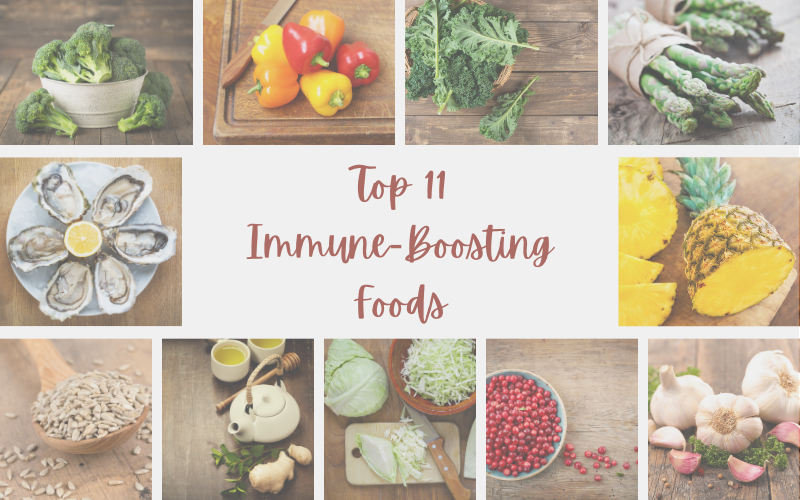You’ll also want to limit your intake of refined sugars and inflammatory foods, and find healthy outlets for stress to keep your immune system functioning at its best. Â
 Here are the best foods for immune health to help keep you safe during these challenging times and channel your body’s natural ability to fight illness.  Â
Immune-Boosting Foods:Â
1. Green TeaÂ
Green tea contains a powerful antiviral catechin called epigallocatechin-3-gallate (EGCG) that has been shown to fight various viruses (1). Â
Research shows that EGCG is one of the five different types of catechins in green tea, resulting in 59% of the total polyphenols in green tea (1). Try adding two or three cups to your diet per day. Â
 2. GarlicÂ
Garlic contains a compound called allicin that has antimicrobial properties. Research shows that allicin was found to exhibit antibacterial activity against a wide range of bacteria, including drug-resistant strains.  Â
It also has antifungal activity, especially against Candida albicans, and antiviral properties, due to its involvement in chemical reactions among various enzymes (2). Â
Try adding sautéed garlic to your meat and vegetable dishes to enhance the flavor and support your immune health. Â
3. OystersÂ
Oysters are an excellent source of zinc, which helps boost your immune system by decreasing inflammation and the generation of inflammatory cytokines in the body (3). Â
Zinc also directly acts on T helper cells to protect against the common cold (4). Other foods that are high in zinc include beef, chicken, pumpkin seeds, cashews, chickpeas, and peas.Â
4. Bell peppersÂ
Bell peppers are an excellent source of vitamin C, which has antioxidant abilities in the body. Vitamin C is especially beneficial for reducing the duration and severity of the common cold (5).Â
Enjoy bell peppers in a stir-fry or eat them raw as a snack with hummus.Â
5. Pineapple
Pineapple contains an enzyme known as bromelain that has powerful anti-inflammatory effects on the gut. Â
Research shows that bromelain activates the healthy immune system during times of cellular stress while also calming down inflammation-induced overproduction of cytokines (6).  Â
 6. BerriesÂ
Blueberries contain antioxidants polyphenols that contain anti-influenza viral effects. According to one study, the polyphenol content varies depending on the type of berry.Â
Rabbiteye berries tend to have higher antiviral effects than other berries, including Northern, Southern, and Half Highbush berries (7). Â
Try adding more bilberries, cranberries, and blackcurrant berries into your diet when possible. Â
7. BroccoliÂ
Broccoli contains a compound called indole-3-carbinol that helps increase blood levels of 3,3′-diindolylmethane (DIM), which is a compound that boosts immunity (8). Â
One study found that mice who were fed this compound were better able to clear certain viruses from their intestines (8). Â
Enjoy broccoli and other cruciferous vegetables in a stir-fry with the protein of your choice. Â
8. CabbageÂ
Just like broccoli, cabbage contains DIM, which can help activate your body’s antiviral abilities. In addition to clearing viruses from the intestines, research shows that DIM may boost the immune by preventing the growth of cancer cells (8). Â
Cabbage is also a good source of vitamin C and helps keep your digestive system running smoothly, which is a major component of a healthy immune response!Â
For even more digestive and immune-boosting results, try adding sauerkraut (fermented with no sugar added) to your diet several times a week.Â
9. KaleÂ
Kale is a superfood packed with many nutrients that support total body health. It’s known as the king of calcium and is an excellent source of antioxidants and vitamins A and C, which support immune health by neutralizing free radical toxins.Â
You’ll want to remove the stems from your kale before cooking it. Otherwise, kale can be rather tough to eat!  Â
You can also use baby kale as it’s much more tender. However, regular kale may contain more nutrients as the plant has had more time to mature before being picked.  Â
10. Sunflower SeedsÂ
Sunflower seeds are an excellent source of vitamin E, which helps keep your immune system healthy due to its antioxidant and inflammation-lowering abilities. Â
They are also a good source of fiber to boost the overall health of your gut microbiome (9). You can add sunflower seeds to your salad or enjoy a handful at snack time!Â
You can also add sunflower butter to your shopping list. It makes a great option for kid’s sandwiches. Look for a brand that contains no added sugars or oils. Â
11. AsparagusÂ
Asparagus contains prebiotic fibers that help boost your immune system by feeding the good bacteria in your gut (10). Other prebiotic foods include bananas, onions, and leeks. Â
ReferencesÂ
……………..Â
 Â








